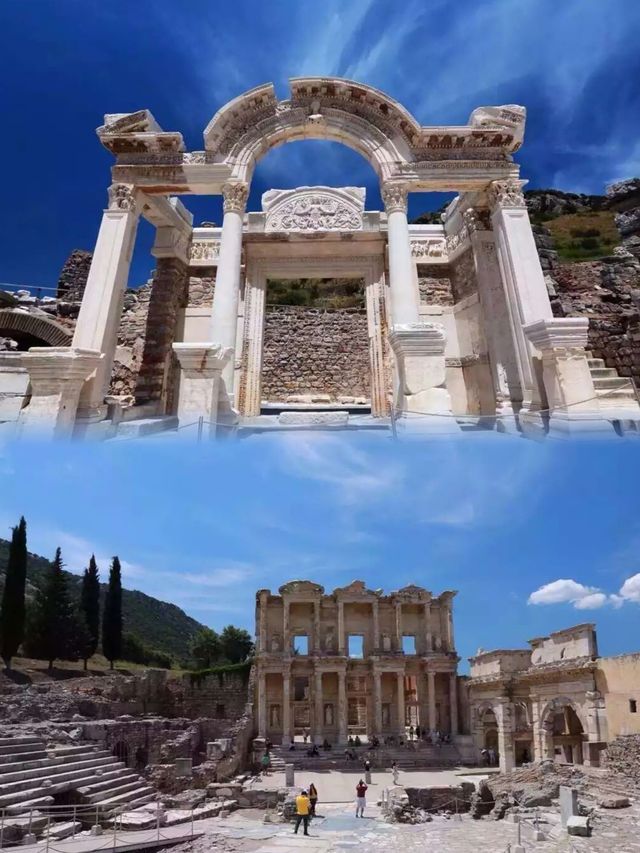Exploring the Ruins of Ephesus
lovetrip12
Ephesus Archaeological Site
AdventurousExplorers
Turkey | A story of an old city spanning a millennium
TranquilDestinations
Turkey | The story of an ancient city spanning thousands of years
TranquilDestinations
Travel to the ancient city of Ephesus in Turkey.
cassiavalentine79
Ephesus
Herman_traveller
Ephesus Turkey
mortaloveangel
Popular Trip Moments
The ancient city of Ephesus. | Exploring the Ruins of Ephesus | Library of Celsus: Ancient Marvel in Turkey 🇹🇷 | Ephesus - A Witness to Prosperity in Turkey | Ephesus Archaeological Site | Turkey | A glance at a thousand years, exploring the mysterious ancient city of Rome | Myths of the Seven Sleepers of Ephesus | Ephesus Ancient City | Turkey | A story of an old city spanning a millennium | Enchanting Istanbul, where Eastern and Western cultures meet | The Ephesus Ancient City Tour - A thousand-year secret shared by 300,000 men! | A walk to remember- EPHESUS, Turkey | Ephesus memoir | Ancient City of Ephesus | Ephesus, The Ancient city in Izmir Turkey | Ephesus - great theatre & library of Celsus | Turkey | The story of an ancient city spanning thousands of years | Travel to the ancient city of Ephesus in Turkey. | Ephesus Ancient City | Village Of Şirince | get lost in the lost city of Ephesus | great days in Palm Wing Efesus Hotel | can’t Ephesus enough how amazing this is | Day trip from İzmir to Ephesus | Ephesus ancient site of Turkey | Ephesus In Izmir – One Of The Seven Wonders
Popular Travel Types
Recommended Attractions at Popular Destinations
Bangkok attraction near me | Tokyo attraction near me | Manila attraction near me | Hong Kong attraction near me | Seoul attraction near me | Taipei attraction near me | Los Angeles attraction near me | New York attraction near me | Shanghai attraction near me | Kuala Lumpur attraction near me | Shenzhen attraction near me | Osaka attraction near me | London attraction near me | Singapore attraction near me | Guangzhou attraction near me | San Francisco attraction near me | Beijing attraction near me | Macau attraction near me | Bali attraction near me | Paris attraction near me | Orlando attraction near me | Jakarta attraction near me | Ho Chi Minh City attraction near me | Chicago attraction near me | Phuket attraction near me | Toronto attraction near me | Dallas attraction near me | Istanbul attraction near me | Cebu attraction near me | Seattle attraction near me
Popular Attractions
Dalian Night Bazzar | Hells Gate | Giethoorn | Elephant Jungle Sanctuary Phuket | Crystal Cove Island | Xi 'an City Wall | Waiotapu Thermal Wonderland | Tokyo Disneyland | Manas River Grand Canyon | Orana Wildlife Park | Kawasan Falls | Hassan Dairy Circle | Momo Mac | Shiba Pan (Eighteen Bends) | Leifeng Tower | Maa Gojabayani Temple | Viewing Fish at Flower Harbor | 18 Ulica Westerplatte | Church P.W. St. Michael the Archangel | Masjid NU Puncak Gunung Balak | Southcrest Park | (Dhurakhet) tea garden | Navab Kuwa नवाब कुवा | Aquarium surabaya (mrm akuarium custom papa fatih) | Estadio | Child park | FIU Softball Stadium | AGA Club house | Gold Coast Sea World | Karl's Adventure Village Rövershagen
Popular Restaurants in Selcuk
selcuk pidecisi | orhanbey cigercisi selcuk | Ufuk Pide | Aciktim Restaurant | Zeus Cafe & Restaurant & Wine House | Gaziantep Kebab Salonu | Ejder Restaurant | Boomerang Guesthouse & Restaurant | Sirince Artemis Restaurant and Wine House | Şirince Keyfince Cafe Restaurant | Kirkinca Arsipel Restaurant | Seçkin Firuze Restaurant | Yedi Bilgeler Restaurant | Kahvecin | Yavuz'un Yeri | Agora Restaurant | Gulgun Abla'nin Yeri | Okumus Mercan Restaurant | Maza Kitchen | Kahve Hatırası | Selcuk Koftecisi | Ayse Hanimin Yeri | Cabare Cafe Bar | Seckin Cigerci | Sirince'm Sakli Vadi | Can restaurant | Tolga Cop Sis | Saylo Bufe | Selcuk Balik Pisiricisi | Celsus Cafe
Payment Methods
Our Partners
Copyright © 2024 Trip.com Travel Singapore Pte. Ltd. All rights reserved
Site Operator: Trip.com Travel Singapore Pte. Ltd.
Site Operator: Trip.com Travel Singapore Pte. Ltd.



















